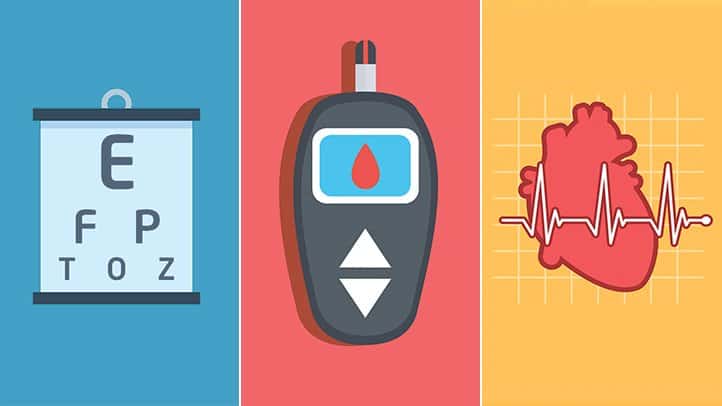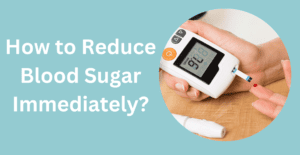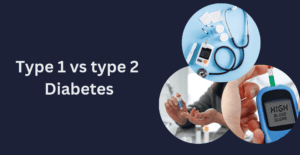Diabetes is a chronic metabolic disorder that affects millions of people worldwide. High blood sugar levels characterize due to the body’s inability to produce or effectively use insulin, a hormone responsible for regulating blood sugar. There are several types of diabetes, including type 1, 2, and gestational diabetes. Diabetes diagnosis is typically made by measuring blood glucose levels and other diabetes diagnosis tests. Diabetes treatment includes lifestyle modifications, such as healthy eating and regular physical activity, as well as medication and insulin therapy. Effective management of diabetes is essential to prevent complications and improve quality of life.
How is Diabetes Diagnosed?
Diabetes is a chronic metabolic disorder characterized by high blood sugar levels due to the body’s inability to produce or effectively use insulin. It is a common condition that affects millions of people worldwide. Early diabetes diagnosis is crucial to prevent complications and improve quality of life. In this Diabetes Blogs, we will discuss the different tests used to diagnose diabetes.
The diabetes diagnosis is typically made by measuring blood glucose levels. There are several tests used to diagnose diabetes, including the fasting plasma glucose (FPG) test, oral glucose tolerance test (OGTT), and hemoglobin A1C (HbA1c) test.
The FPG test involves measuring blood glucose levels after an overnight fast of at least 8 hours. A normal FPG result is less than 100 mg/dL (5.6 mmol/L), while a result of 126 mg/dL (7.0 mmol/L) or higher indicates diabetes.
The OGTT involves drinking a sugary solution after an overnight fast, followed by measuring blood glucose levels at regular intervals over the next two hours. A normal OGTT result is less than 140 mg/dL (7.8 mmol/L), while a result of 200 mg/dL (11.1 mmol/L) or higher indicates diabetes.
The HbA1c test measures the average blood glucose levels over the past two to three months. A typical HbA1c result is less than 5.7%, while a result of 6.5% or higher indicates diabetes.
In addition to these tests, a random plasma glucose (RPG) test may also be used for diabetes diagnosis. This test involves measuring blood glucose levels at any time of the day, regardless of when the person last ate. A result of 200 mg/dL (11.1 mmol/L) or higher indicates diabetes.
It is important to note that the diabetes diagnosis should be confirmed with a repeat test on a separate day unless the blood glucose levels are very high and symptoms of diabetes are present.
In conclusion, an early diabetes diagnosis is essential for the effective management of the condition. There are several tests used for diabetes diagnosis, including the FPG test, OGTT, HbA1c test, and RPG test. These tests help to measure blood glucose levels and determine whether a person has diabetes. If you are experiencing symptoms of diabetes, such as frequent urination, increased thirst, and blurred vision, it is important to consult a healthcare professional for proper diagnosis and treatment.
Treatment of all types of Diabetes
There are several types of diabetes, including type 1, 2, and gestational diabetes. Although the diabetes treatment may vary depending on the type of diabetes, the overall goal of treatment is to maintain normal blood sugar levels and prevent complications. In this blog, we will discuss the treatment options for all types of diabetes.
- Lifestyle modifications: One of the primary goals of diabetes treatment is to manage blood sugar levels through lifestyle changes. This includes following a healthy diet, Diabetes Recipes, regular exercise, and maintaining a healthy weight. A diet rich in fiber, whole grains, fruits, and vegetables, while avoiding processed and sugary foods can help control blood sugar levels. Regular physical activity helps improve insulin sensitivity and lower blood sugar levels.
- Medications: Diabetes medications are often used to control blood sugar levels in people with diabetes. The type of diabetes medications used depends on the type of diabetes and individual circumstances. People with type 1 diabetes require insulin therapy to replace the insulin their body is not producing. People with type 2 diabetes may be prescribed oral medications that help the body use insulin more effectively or injectable diabetes medications that stimulate insulin production.
- Insulin therapy: Insulin therapy involves injecting insulin into the body to replace the insulin the body is not producing. There are several types of insulin, including rapid-acting, short-acting, intermediate-acting, and long-acting insulin. The type of insulin and dosing schedule will depend on individual needs.
- Blood sugar monitoring: Regular blood sugar monitoring is an important part of diabetes treatment. This helps individuals track their blood sugar levels and adjust their diabetes treatment plans as needed. This may involve self-monitoring of blood glucose levels at home or periodic blood tests to monitor blood sugar levels.
- Education and support: Education and support are crucial for effective diabetes management. This may include working with a healthcare team to develop an individualized diabetes treatment plan, learning how to monitor blood sugar levels, and recognizing the signs of high or low blood sugar levels. Support from family, friends, and diabetes support groups can also help individuals cope with the challenges of diabetes.
In conclusion, diabetes treatment involves a combination of lifestyle modifications, diabetes medications, insulin therapy, blood sugar monitoring, and education and support. It is important to work with a healthcare team to develop an individualized diabetes treatment plan and make adjustments as needed. Effective management of diabetes can help prevent complications and improve quality of life. Get a better understanding of Diabetes Meaning & Causes.
Home Remedies & Lifestyle Tips to treat Diabetes
Diabetes is a chronic metabolic disorder characterized by high blood sugar levels due to the body’s inability to produce or effectively use insulin. Although diabetes requires medical diabetes treatment, there are several home remedies for diabetes and lifestyle tips that can help manage blood sugar levels and improve overall health. In this blog, we will discuss some effective home remedies for diabetes and lifestyle tips for managing diabetes.
- Follow a healthy diet: A healthy Diabetes Diet Plan is crucial for managing diabetes. A diet rich in fiber, whole grains, fruits, and vegetables, while avoiding processed and sugary foods can help control blood sugar levels. Include foods that are high in protein, such as lean meat, fish, and beans, and limit foods that are high in saturated and trans fats.
- Regular exercise: Regular physical activity is an important part of diabetes management. Exercise helps improve insulin sensitivity and lower blood sugar levels. It can also help with weight management, reduce stress levels, and improve overall health. Aim for at least 30 minutes of moderate exercises, such as brisk walking, cycling, or swimming, most days of the week.
- Stay hydrated: Drinking plenty of water and staying hydrated is important for managing diabetes. Dehydration can affect blood sugar levels and cause complications. Aim to drink at least 8-10 glasses of water per day and avoid sugary drinks.
- Get enough sleep: Getting enough sleep is important for managing diabetes. Lack of sleep can affect blood sugar levels and increase insulin resistance. Aim for 7-8 hours of sleep each night and establish a regular sleep routine.
- Manage stress: Stress can affect blood sugar levels and make diabetes management more difficult. It is important to manage stress through relaxation techniques, such as deep breathing, yoga, or meditation. Engaging in activities that you enjoy, such as reading, spending time with loved ones, or listening to music can also help reduce stress levels.
- Use natural remedies: Several natural home remedies for diabetes have been found to help manage diabetes. These include herbs, such as fenugreek, cinnamon, and bitter melon, which have been shown to lower blood sugar levels. Chromium supplements have also been found to improve insulin sensitivity.
In conclusion, managing diabetes requires a comprehensive approach that includes medical diabetes treatment, healthy lifestyle habits, and natural home remedies for diabetes. Following a healthy diet, regular exercise, staying hydrated, getting enough sleep, managing stress, and using natural home remedies for diabetes can all help manage blood sugar levels and improve overall health. It is important to work with a healthcare professional to develop an individualized treatment plan and make adjustments as needed.
When should I see a Doctor for Diabetes?
If you suspect that you have diabetes, it is important to see a doctor as soon as possible for proper diagnosis and diabetes treatment. In general, it is recommended to see a doctor if you are experiencing any of the following symptoms:
- Increased thirst and urination: If you notice that you are drinking more fluids than usual and urinating more frequently, it may be a sign of high blood sugar levels.
- Fatigue: If you feel unusually tired or lethargic, it may be a sign of uncontrolled diabetes.
- Blurred vision: High blood sugar levels can affect the blood vessels in the eyes, causing blurred vision or other vision problems.
- Slow-healing sores or infections: High blood sugar levels can affect the body’s ability to heal, leading to slow-healing sores or frequent infections.
- Numbness or tingling in the feet: High blood sugar levels can cause nerve damage, which can lead to numbness, tingling, or pain in the feet and legs.
- Unexplained weight loss: If you are losing weight without trying, it may be a sign of uncontrolled diabetes.
- Family history of diabetes: If you have a family history of diabetes, it is important to get regular check-ups and screenings to detect diabetes early.
It is important to note that some people with diabetes may not experience any symptoms at all. This is why it is recommended to get regular check-ups and blood sugar screenings, especially if you have risk factors for diabetes, such as obesity, a sedentary lifestyle, or a family history of diabetes.
In conclusion, if you are experiencing any symptoms of diabetes or have risk factors for diabetes, it is important to see a doctor for proper diagnosis and treatment. Early detection and management of diabetes can help prevent complications and improve quality of life.
The Bottom Line
The above discussion highlights the importance of seeking medical attention when experiencing symptoms of diabetes or having risk factors for the disease. Some of the common symptoms of diabetes include increased thirst and urination, fatigue, blurred vision, slow-healing sores or infections, numbness or tingling in the feet, unexplained weight loss, and a family history of diabetes. Regular check-ups and blood sugar screenings are also recommended for people with risk factors for diabetes. Additionally, the discussion emphasizes the importance of managing diabetes through lifestyle changes, including a healthy diet, regular exercise, hydration, adequate sleep, and stress management. Natural remedies, such as herbs and supplements, may also help manage blood sugar levels. However, it is essential to work with a healthcare professional to develop an individualized treatment plan and make adjustments as needed.
FAQs
How can I cure Diabetes Naturally?
Unfortunately, there is no known diabetes cure. Diabetes is a chronic metabolic disorder that requires lifelong management to prevent complications and maintain overall health. While there are several natural remedies and lifestyle changes that can help manage diabetes, it is important to note that they do not provide a cure for the disease.
Natural remedies that have been found to help manage blood sugar levels include herbs such as fenugreek, cinnamon, and bitter melon. Chromium supplements have also been found to improve insulin sensitivity. However, it is important to note that natural remedies may not work for everyone, and they should not be used as a substitute for medical treatment.
The most effective way to manage diabetes is through a comprehensive approach that includes medical treatment, lifestyle changes, and regular monitoring of blood sugar levels. Medical treatment for diabetes may include diabetes medications, insulin therapy, or other interventions to help manage blood sugar levels. Lifestyle changes, such as following a healthy diet, regular exercise, hydration, adequate sleep, and stress management, can also help manage blood sugar levels and prevent complications.
What is the Best Treatment for Diabetes?
The best treatment for diabetes varies depending on the individual’s specific needs, medical history, and type of diabetes they have. In general, treatment for diabetes aims to manage blood sugar levels and prevent complications of the disease.
Medical treatment for diabetes may include oral diabetes medications, injectable medications, or insulin therapy. Oral medications are typically used to help lower blood sugar levels, while injectable diabetes medications and insulin therapy are used to help the body use insulin more effectively. Some people with type 2 diabetes may be able to manage their condition through diet and exercise alone, while others may require medication or insulin therapy to control their blood sugar levels.
In addition to medical treatment, lifestyle changes are also an important part of managing diabetes. Eating a healthy diet, getting regular exercise, maintaining a healthy weight, and managing stress can all help manage blood sugar levels and prevent complications of the disease. It is important to work with a healthcare professional to develop a comprehensive treatment plan that includes both medical treatment and lifestyle changes.
Can Diabetes be cured completely?
Currently, there is no known diabetes cure. Diabetes is a chronic metabolic disorder that affects the way the body processes glucose, and it requires lifelong management to prevent complications and maintain overall health.
While there is no diabetes cure, it is possible for some people with type 2 diabetes to achieve remission of the disease through weight loss, a healthy diet, and regular exercise. Remission means that blood sugar levels have returned to normal without the use of diabetes medications, and it can be sustained as long as the individual maintains a healthy lifestyle. However, it is important to note that remission is not a diabetes cure, and it is still important for individuals to monitor their blood sugar levels and maintain a healthy lifestyle to prevent the recurrence of the disease.
For people with type 1 diabetes, there is no known way to diabetes cure, and they will require lifelong insulin therapy to manage their blood sugar levels.
Can Diabetes be cured by Exercise?
While exercise cannot diabetes cure, it can help manage blood sugar levels and prevent complications of the disease. Exercise helps the body use insulin more effectively, which can help lower blood sugar levels. Additionally, regular exercise can help with weight management, improve cardiovascular health, and reduce stress, all of which can have a positive impact on overall health and diabetes management.
The American Diabetes Association recommends that individuals with diabetes get at least 150 minutes of moderate-intensity aerobic exercise per week, spread over at least three days per week, with no more than two consecutive days without exercise. Resistance training, such as weight lifting, is also recommended at least two times per week. It is important to work with a healthcare professional to develop an exercise plan that is safe and appropriate for your specific needs.
While exercise is an important part of diabetes management, it should be used in conjunction with medical treatment and other lifestyle changes, such as a healthy diet and stress management. It is important to monitor blood sugar levels before, during, and after exercise and make adjustments to diabetes medications or food intake as needed to prevent hypoglycemia (low blood sugar).









